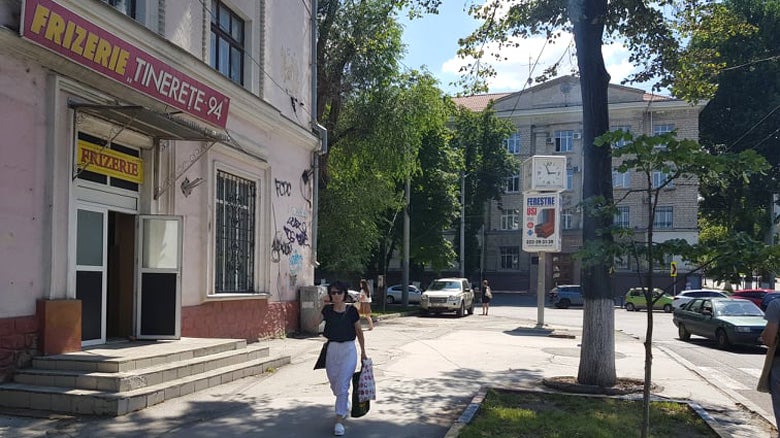Photo: Boris Ciobanu, World Bank
Viorica C. has run a hair salon in Chisinau for several years now. Before the COVID-19 crisis hit Moldova, her business was flourishing, and on a regular day, she would have six stylists on the floor doing their magic. On March 17, 2020, the country’s state of emergency forced Viorica to close her salon temporarily.
Today, Viorica is back in business, but it’s a different place now. Only two stylists are allowed to work on an average day, and not all services can be offered. What did not change, however, is the magic: Viorica’s customers are as happy as ever.
How is the COVID-19 pandemic impacting businesses in Moldova? How are they coping? What can be done to support their recovery?
To answer these questions, the World Bank conducted an Enterprise Survey in Moldova, following up with the same firms that were interviewed for the 2019 Enterprise Survey. This comparison has made it possible to quantify the impact of the shock across several dimensions, including sales, employment, liquidity, and expectations.
Moldova is the first in a series of 39 countries for which this first round of data since the outbreak of COVID-19 are available. The data provide a snapshot of business performance at the height of the crisis in April 2020 relative to the pre-COVID-19 baseline. The 10 findings help to shed light on the growing impact of the outbreak on the country’s private sector.
1. Almost one-fifth of businesses may have succumbed to the economic shock caused by the required shutdown. Obtaining the exact figure of firm exit is difficult, given that many businesses have temporarily closed operations or adopted remote work arrangements. At least 1 percent have closed permanently. If it is assumed that respondents to the baseline Enterprise Survey who are now unreachable have also ceased operations, the estimated rate of closures would increase to 15 percent of firms. Taking the hardest hit is the services sector, where the assumed exit rate reaches 18 percent
2. Compared to the same period in the previous year, annual sales declined by 57 percent on average, with small businesses faring the worst. The change in sales has disproportionately affected small businesses that employ between 5 and 19 workers and businesses engaged in manufacturing.
3. Employment has dropped by a relatively smaller rate. Estimates from the survey show that roughly 13 percent of companies have cut their workforce, though 20 percent of the overall workforce in the sample have been affected by the crisis in some way (figure 3). Since the outbreak of COVID-19, 1,600 workers have been laid off from small, medium, and large firms in the private sector; another 4,600 have taken five or more days of leave or have quit due to illness, childcare interruptions, or mobility restrictions; and over 33,000 workers have been placed on unpaid leave or furloughed.
4. Spillovers from the loss of sales are likely to continue, with an impact on both private sector and government revenues. Firms have already delayed payments in an effort to cope with the decline in sales, with more than 45 percent forced to postpone payments to suppliers (figure 4). Beyond the private sector, government revenues are also expected to fall as over a fifth of firms have delayed payments of their tax obligations. Well over half of the firms in Moldova anticipate falling into arrears on outstanding liabilities in the coming weeks.
5. Businesses with a female top manager are faring relatively better. Businesses led by women seem to be doing somewhat better than those managed by men. While sales have risen in only 1 percent of male-managed firms, fully 10 percent of female-managed businesses have experienced an increase in sales. Viorica’s business is not yet among them but hopefully soon will be. What is more, employment among female-managed businesses has shrunk by about 2 percent compared 9 percent among firms managed by men.
6. Businesses appear to be adapting to the changing circumstances caused by the outbreak of COVID-19. One-third of businesses have started or increased their online business activity, and a quarter have started or seen a rise in the delivery of goods or services. About 19 percent of enterprises have introduced or adjusted their products or services due to the outbreak, with large companies reacting more swiftly than smaller ones.
7. Firms with a history of innovation are better positioned to sustain the shock. As discussed in a Special Focus Note on Moldova (World Bank 2020), innovation had been on the rise among Moldovan companies even before the crisis. According to the 2019 ES, prior to the outbreak of COVID-19, nearly 40 percent of businesses had introduced a new product or new production process. This innovation capability has translated into stronger resilience as shocks have hit the economy, and since the start of the pandemic, these businesses have been performing relatively better in terms of sales and employment.
8. Government relief programs need to expand their coverage. According to the survey, only about 3 percent of businesses have already received or expect to receive government assistance. Twenty-seven percent of firms think they do not qualify for assistance, while 23 percent are not even aware of the available business support programs. Thus far, large firms are disproportionately benefiting from government support. Most of the assistance to date has been provided in the form of fiscal support - tax deferrals or fiscal relief, followed by deferrals of credit payments.
9. More effective policies are needed to support companies during the recovery and strengthen resilience going forward. Businesses that currently have no support and no sales report that they are not likely to survive beyond five weeks and will soon face a liquidity crisis. Although mass closures are unlikely, 16 percent of businesses were temporarily closed at the time of the interview, and over half have closed at some point since the COVID-19 outbreak. Immediate policy interventions are clearly needed to flatten the curve of survival time and speed up the recovery. When asked about the type of government support that would be most helpful under the current circumstances, nearly half of the businesses indicated a reduced tax burden and lower parafiscal fees to be among the top five policy priorities (figure 9). An easing of trade and credit restrictions, still present in Moldova, are next on the list.
10. Business confidence points toward a positive outlook: Moldovan firms expect to return to normal levels of business within six months. Employment, which has not been as affected as sales, is expected to return to normal levels in about 45 days. Sales, however, are expected to take at least six months to get back to pre-crisis levels.
Returning to the hair salon, Viorica is confident that she will manage to bring all six of her stylists back to the floor soon. To confirm that this does happen and to further assess the economic situation on the ground, two more rounds of the survey are planned for later this year. For now, although businesses across Moldova have been affected by the pandemic, let us focus on the positives: innovation, adaptability, and female leadership have emerged as some of the key strengths among Moldovan companies in the midst of the crisis.
As innovation strengthens and expands, resilience grows and optimism follows. At the same time, wider and more effective government policies are needed to help companies recover. But action is needed now - it cannot wait. Together, we can Build Back, and we can Build Back Better.





Join the Conversation